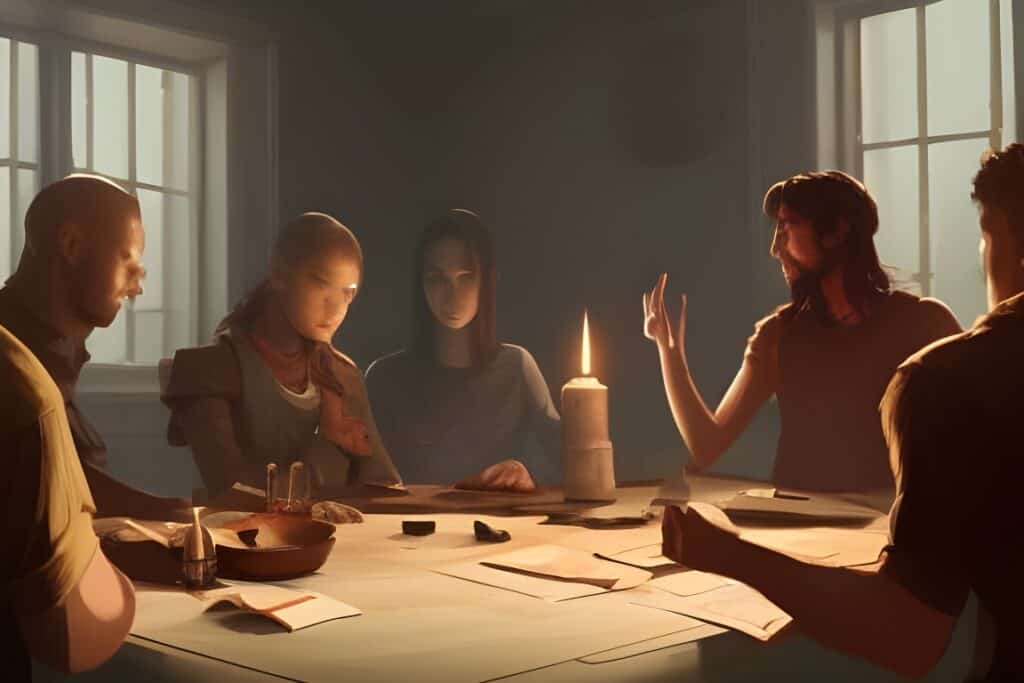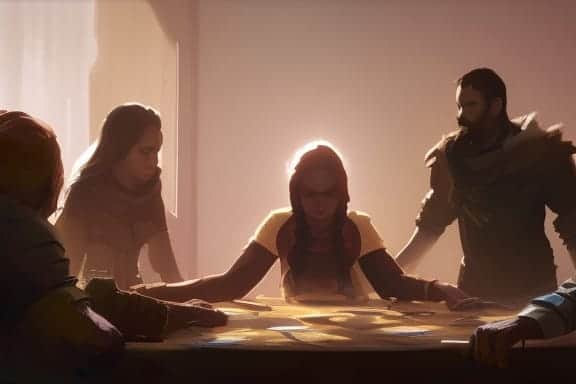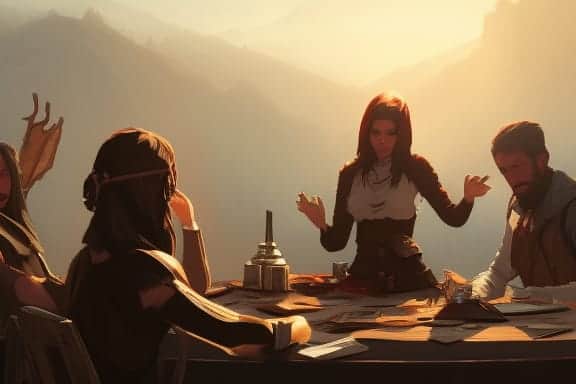A common statement in tabletop roleplaying groups is “problem players”. Other terms like disruptive, toxic, or others may be used. The words we use when communicating are essential as they are what create the way we think, both about ourselves, others, and the world around us. Communicating with players causing perceived trouble in games can often be solved in just a few minutes of real open, honest, genuine conversation. Let’s cover what these players may do, how you can talk with them, and how to handle situations if talking doesn’t work.

How to understand problem players
3 Most common behaviors “Problem players” do
Making choices that go opposite of the rest of the group or story direction. While it can be really difficult and disruptive to a group it’s not as difficult as you may think. Often you can simply let players do their thing and go with the flow.
It may be difficult to deal with more for the fact that the party is now split. This forces the GM to deal with two groups of player actions instead of just one. The major downside I hear from GMs about this behavior is that it can take up a tremendous amount of time.
Making characters that contradict themselves, or established game parameters. When a GM comes up with a game concept and sets forth specific character guidelines and a player chooses to ignore them, this is a problem. That said if you are a GM that allowed that player into the group knowing he didn’t follow the rules then it’s really all on you. Saying that however, you can also do the above and just let things go as they will and see what kind of a mess is created (which essentially becomes the new game, but heck see what kind of fun you can have with it).
Alternately some players make characters that for whatever reason contradict the very nature of their character class. While you may not get the character concept, the player does. Ask him about how he thinks it makes sense. If a different class/spell/etc makes more sense to you for the character idea then mention that and ask them to change to that. See where it goes from there.
Actively making plans ingame to go against other players. If you are playing evil characters then this shouldn’t be a problem, but if you aren’t then it totally can be. All of these problems however are simply how that person finds fun in their roleplaying.

Are you for the group or against it?
We all want the same
We are all trying to enjoy ourselves, feel included, include others, be part of the group, etc. It’s extremely rare to find people that deliberately try to sabotage the actions of the group and other players.
If you run into players actively trying to disrupt other players, you can ask them not to return. In their sense of self that may be what they were trying to have you do in order to feel like they won. Their sense of self requires things to be a “me vs them” scenario and they can’t see things any other way.
Don’t be this kind of player
In roleplaying games, if not in life, it’s imperative that you come up with solutions. What happens to a lot of us is we get in a habit of telling everyone what “the problem” is with an idea they’ve come up with. Don’t be that kind of player.
Instead of saying there’s a problem point out some concerns and give your own possible solutions for them. Better yet, just add your own ideas to theirs and let the GM point out any flaws if they see fit.
Making problems out of small details
Another common habit that we fall into is getting caught up in the absolute tiniest details and making massive problems out of them. There are only problems that you decide are problems. Consider the following questions when troubles arise in your games:
- Do I want this to be a problem to solve?
- What are some consequences you can think of if you make a problem out of the situation?
- Will those consequences help bring the group together or possibly drive players apart?
- Instead of making a problem out of things can you simply write them off as flavor for the scenario?
- How does focusing on the small details help progress the story?
- What does it do for you to behave this way?
These are some questions that can help redirect a conversation that has taken a negative direction. Let’s cover each question in a little more detail.
Do I want this to be a problem to solve?
When you get bogged down in little details it often mires the party in uncertainty. Observe your players and see if they are easily willing to participate or if they are hesitant to do so. Many players that have had their ideas questioned over and over will tend to hold back. What does it actually add though to the game to worry over tiny things?
It might help you to think of your campaign’s game sessions more like a one-shot. In that time to play is precious and it’s not doing any good to slow down to minor details. Instead, try focusing the game session on getting to the juicy details. It doesn’t have to be combat, but get the players involved in the critical stuff that leads to the overall game idea. Otherwise, you’ll create unintended consequences.

Does it have to be a problem?
What are some consequences you can think of if you make a problem out of the situation?
The more destructive consequences are in how your players are willing or unwilling to come up with ideas. This can become even worse when players start to feel resentment. This resentment can turn to bitterness.
Players can start to resent GMs always turning things against them, or essentially making it feel like the game world is “out to get them”. Listen to the words your players use. Are they saying things like “unlucky”, or perhaps “nothing goes my way”? Ask them why they say that and perhaps how their past games have been, it will tell a lot.
Will those consequences help bring the group together or drive players apart?
Working together to accomplish tasks is confidence boosting. Having one’s ideas considered and rewarded does the same. When ideas constantly get shot down, “Why give them. Why try?” sentiments start to creep in. This can be what starts splitting the party apart, and may already be in place.
You don’t have to let every idea they come up with turn out well, or just give them loot. Im simply saying, if players come up with reasonable ideas, allow them as a possible solution.
Instead of making a problem out of things can you simply write them off as flavor for the scenario?
Flavor in a tabletop roleplaying game is simply added text, descriptions, actions, or words that are intended to convey a certain feeling about the setting. If you read game books you’ll see it in the stories. Character or setting descriptions that often don’t directly reflect the game rules but convey what the game setting is intended to be like.
With World of Darkness, this usually shows up in a gruesome tale of Werewolves, cold-hearted behavior from Vampires, and the like towards humans. In Rifts, you see it in the scarcity of resources in the post-apocalypse setting. These are just some examples, but the idea is to simply put concerns to the side saying “This is meant as flavor for the setting, don’t think overly hard and make up problems from this”.

How does focusing on the small details help progress the story?
If you have created a campaign or are a player in one, why would you create problems that detract from being able to move the game forward?
This is a question I ask myself on a regular basis when roleplaying. As a gamemaster you are the one making the story- so why stop yourself from sharing that story? As a player, your character progression slows, if not stops, if you are unable to progress the story.
What does it do for you to behave this way?
After knowing someone’s background and coming to an understanding about progressing the story you can finally ask this.
This will tell you a lot about what “problem players” enjoy when roleplaying. Perhaps they are just finding humor in messing with other players and are not intending to be rude/mean/etc.
Or perhaps they enjoy being the center of attention, so you can offer them situations to do just that more.
They may just want more treasure, which a GM can easily remedy by providing more. If players and GMs are in a scarcity mindset then it’s natural some will try getting more from other players. Be in an abundant mindset.
In my games as GM or player, we often hand out loot abundantly. Many of my characters and players have so much stuff that they basically need to create wardrobes for spare gear. When going out to do things we all have an idea for what we’ll take to the local city, out around town, traveling, and the like. Both the GM and players have an understanding together that we won’t mess with each other’s stuff nor will NPCs. This is where ground rules come in.

Dont let players push you around. Stand for the rules you set forth.
Set specific game rules with all players
When you are recruiting players to join your game make sure everyone is on the same page.
Determine the group’s focus on roleplaying (story progression, combat, romance, social encounters, adventure, exploration, etc).
What is acceptable behavior within the party and what isn’t? (Player stealing, teasing, off-color jokes, etc)
What will be tolerated and what won’t? (Kid-friendly roleplaying can be very different than an adult for example)
If you set parameters for your games and then players show up trying to go outside of them its easy to stand your ground. “These are the game rules that everyone else is following, please do so as well”. Here is a quick glance at why we all take the actions we do.
4 basic psychological needs (Ya I know hear me out)
Many books on psychology discuss the basic needs we all seek. These are the reasons behind the actions we take. Understanding the following will help you detach from labeling others’ actions and instead understand what they want.
Comfort/security– Quickly speaking if you are not comfortable in a situation you are not going to stay. This is where the fight or flight system kicks in. If you walk into an environment you aren’t familiar with then you will be uneasy and look to leave asap. In a roleplaying context, this often goes away for players after a session or two.
Genuine(self-esteem)– The next thing we all look for is to feel like it is ok for us to be ourselves. When you get into a group and don’t understand why others say or do things they do then it’s going to cause you to feel uncertain and potentially look for another group.
Significance/importance– All of us want to feel a sense of importance. This is possibly where problem players may differ from your other players. A sense of importance may be gained from the actions they take that others simply don’t understand. It may feed their ego to get kicked from games in fact.
Connection– Lastly we all want to feel part of something. We all want to be accepted and included in what’s going on. So, try to connect with your players and seek which of these needs isn’t being met. Getting to the root of your player’s mindset will help you determine the best course of action.
